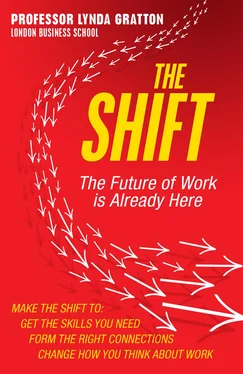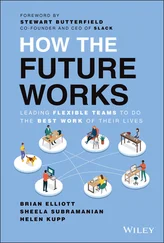THE SHIFT
THE FUTURE OF WORK IS ALREADY HERE
LYNDA GRATTON

For my mother Barbara’s grandchildren
– the ‘regenerative generation’ –
Carla, Max, Christian, Frankie, Dominic, Hunter,
Freddie, Tilly, Jasmine, Eve and Summer
Contents
Cover
Title Page THE SHIFT THE FUTURE OF WORK IS ALREADY HERE LYNDA GRATTON
Preface - Tomorrow’s work begins today
Introduction - Predicting the future of work
PART I - The Forces That Will Shape Your Future
Chapter 1 - The five forces
PART II - The Dark Side of the Default Future
Chapter 2 - Fragmentation: a three-minute world
Chapter 3 - Isolation: the genesis of loneliness
Chapter 4 - Exclusion: the new poor
PART III - The Bright Side of the Crafted Future
Chapter 5 - Co-creation: the multiplication of impact and energy
Chapter 6 - Social engagement: the rise of empathy and balance
Chapter 7 - Micro-entrepreneurship: crafting creative lives
PART IV - The Shift
Chapter 8 - The first shift: from shallow generalist to serial master
Chapter 9 - The second shift: from isolated competitor to innovative connector
Chapter 10 - The third shift: from voracious consumer to impassioned producer
PART V - Notes On The Future
Chapter 11 - Notes to children, CEOs and governments
Endnotes
Bibliography
Learning more about The Shift
Acknowledgements
Index
About the Author
Copyright
About the Publisher
Preface
Tomorrow’s Work Begins Today
It all began with one of those simple questions that teenagers have a habit of asking. Seated at the morning breakfast table, I found my train of thought interrupted by my eldest son Christian who, 17 years old and fresh out of school, was clearly pondering his future.
‘I’m really keen to be a journalist,’ he remarked to his brother and me.
His brother Dominic, two years his junior, perhaps inspired by his lead, followed on with ‘And I’m thinking about medicine.’
Both sentences were spoken with sufficient query that I took them as questions rather than statements of fact.
Having been a professor in a business school, and an advisor to companies for nigh on three decades, I consider myself something of an expert in the why and how of work. Of course, I am also the first to acknowledge that my sons, being teenagers, are unlikely to have much interest in my opinion. But it struck me on that busy morning that I did need at least a point of view about the future of work. The challenge was this: what was my point of view? I began to realise that, despite my years of advising companies and researching work, all I could muster that morning was a rather half-baked, old-fashioned set of assumptions, combined with ‘tidbits’ of data that seemed both hopelessly out of date and extraordinarily incomplete.
Over the following few months, as I pondered on their question, I found that more and more people asked me about their working future. I recall how one of my smartest MBA students wanted to know how he could create a future working life that allowed him to be more of a father to his own family. He explained to me that he believed it was crucial that he spent more time with his yet-to-be-born child than his own father had spent with him as a child. Others wanted to know where to live to gain the most value, the competencies they should focus on and the career paths they should develop. At the same time, the executives I taught wanted to know when to retire, what to do when they reached 65, how to take a gap year, what to say to their companies. Then my research team ran, with colleagues at Unilever, a session with kids under the age of 10. We asked them to talk about their ideas about work. They talked robots and transhumans, computers and global warming. Even at 10, they had begun to play out these future scenarios. And to cap it all, the human resource executives I teach at London Business School seemed to be deeply concerned that their companies were too hierarchical and bureaucratic, and too slow moving to catch up with the trends they saw emerging.
I put these anxieties and questions down in part to the 2009/10 global recessions that rattled everyone. I was feeling the impact myself in my own teaching. Back in 2000 my colleague Sumantra Ghoshal and I had chosen four companies to write extensive case studies on, which would then be taught both at London Business School and also around the world. We chose companies that at that time were in the top five in their sectors and generally admired. From banking we chose the Royal Bank of Scotland; from industry, BP; from investment banking, Goldman Sachs; and Nokia from the technology sector. By mid-2010 RBS had made one of the largest losses in banking history; BP was haemorrhaging oil into the Gulf of Mexico and being castigated by the US Senate for its leadership competence; and Goldman Sachs was in the process of a significant fine from the trading commission. Only Nokia was unscathed, although its share price and value seemed paltry against the mighty Apple. And of course, until 2009, I had directed the Lehman Centre at London Business School. Even ivory tower academics began to feel the winds of change.
When I talked to executives in Nokia and Reuters about the technological developments that are around the corner, and to colleagues at Shell about the coming energy challenges, and indeed to other academics about the growing employee distrust and anxiety they were observing, I began to realise that what I was witnessing was more than simply the backlash from the recession. Added to that, in my twice-yearly visits to India and Africa it was clear these continents were transforming in a way I had never previously witnessed. It began to dawn on me that this was not going to be business as usual. Instead I began to realise that we were entering a time of real flux and possible transformation, and that I was ill equipped to answer the questions I was being faced with.
What I needed was a point of view about the future of work that was more thoughtful and expert than the rather vague and ill-formed views I held. I knew that these questions I was being asked about the future of work were crucial. Work is, and always has been, one of the most defining aspects of our lives. It is where we meet our friends, excite ourselves and feel at our most creative and innovative. It can also be where we can feel our most frustrated, exasperated and taken for granted. Work matters – to us as individuals, to our family and friends and also to the communities and societies in which we live.
I also knew that many of the ways of working we have taken for granted in the last 20 years – working from nine to five, aligning with one company, spending time with family, taking the weekends off, working with people we know well – are all beginning to disappear. And what’s coming in its place is much less knowable and less understandable – almost too fragile to grasp.
However, despite this fragility and the difficulty of grasping the future, I needed answers – and so do the people who asked all these questions. So, of course, do you. Perhaps you don’t need absolute answers. But what you do need, like me, is a point of view, a basic idea of what the hard facts of the future are, and a way of thinking about the future which has some kind of internal cohesion, which resonates with who you are and what you believe. You and I, and my children, and others who are important to us, need to grasp the future of work because we have to prepare ourselves, and we have to prepare others.
Читать дальше













